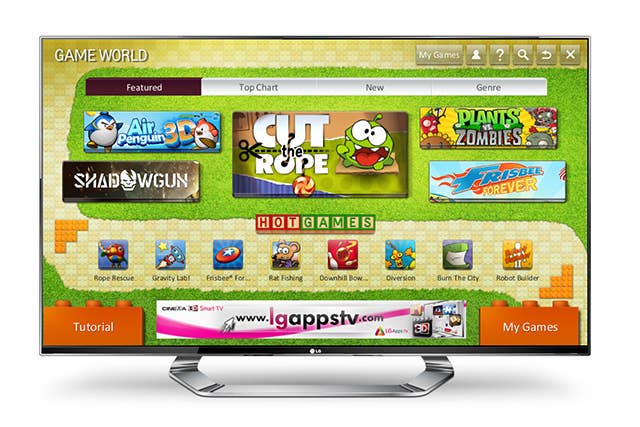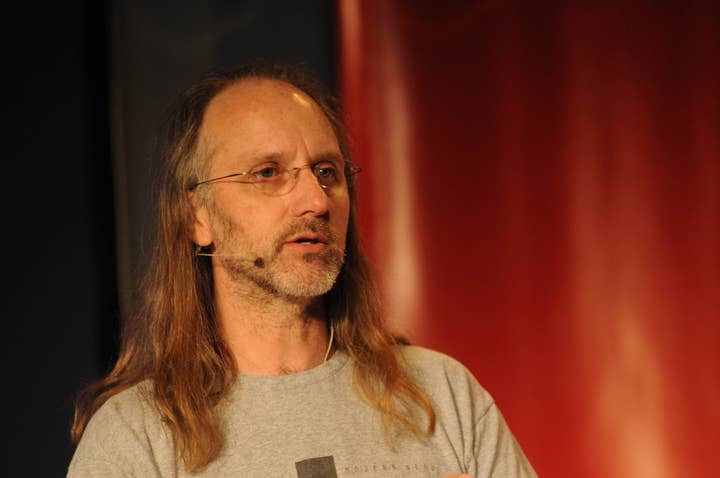EA: "Gaming isn't mass market yet"
CCO Richard Hilleman on the huge opportunity presented by connected TV, and why Apple may not win the front room
The games industry may have taken great strides towards mainstream acceptance, but EA's Richard Hilleman doesn't believe that gaming is a mass market. At least, not yet.
Hilleman is in the UK to deliver the keynote address at TV Connect. It is a conference attended by Samsung, the BBC, Sky, Sony and pretty much all of the biggest companies in television, and yet the CCO of one of the oldest firms in the games business is taking centre stage. In one illuminating hour, Hilleman describes the problems that need to be tackled before connected TV can be a top-tier destination for games of all kinds, and just how fast solutions to those problems are emerging.
And convergence is in the best interests of all parties. Hilleman may ostensibly be here to offer advice, but he's also here to learn. The size of the opportunity is simply too large to ignore.
"The closest thing we've had to a mass market has been the social and mobile spaces. From my perspective, television is the mass market and we're the fringe"
"We have to make sure that game companies know what a mass market really is. We're not one yet," Hilleman says when we meet after his talk. "The closest thing we've had to a mass market, frankly, has been the social and mobile spaces. From my perspective, television is the mass market and we're the fringe. The challenge in front of us is, does the customer think about it that way? Do they see us as so distinct we can't merge those two experiences?"
Hilleman believes that the games industry has a few things to learn about how to talk to huge audiences, even those for the most popular Facebook and mobile games. It has the tendency to, "segment them into groups that are too small to be relevant," and, in doing so, runs the risk of losing their attention for good. That, he says, is crucial to the appeal of connected TV for EA: television is where those people go when they put down their phones and tablets, the gateway to vast swathes of potential new customers.
But the road has been long and circuitous, and its end remains just out of sight. Hilleman admits that the fragmented landscape of connected TV has been a "really confusing" place to do business, but after five years it seems to be arriving at a point of relative stability. "We're very patient," he says, "in that we can see things that are coming that aren't here yet and we can wait for them. To a great extent, this has been a business where we've been watching the pieces develop."
In the last year, EA has shipped app-based content on LG and Samsung connected TVs, and it currently has either tests or commercial deals for game streaming with all but one of the major providers in the space. Hilleman, and by proxy EA, regard the TV as the most valuable platform after consoles in terms of player time and player attention. It is learned behaviour from decades in front of the box, with none of the fickle snacking that attends other mass market devices like smartphones and tablets.
There are still issues in many areas, most of them familiar - availability of high-speed broadband, the disparity between operating systems, designing suitable controllers - but Hilleman believes that the catalyst for an explosion in growth is monetisation. Before now, gaming through connected TVs has tended towards subscription deals for libraries of content, but that doesn't sit well with a company like EA.

"Any subscription model that puts us in a bundle with 700 games means that we're doing all the heavy lifting," he says. "If we do a great product, and then others do 55 mediocre ones and we're all stuffed into the same bundle, good for them, but not good for me. They've cheapened my product by comparison, they've reduced the expectation of greatness in the customer, and they haven't allowed me to create unique value for that customer.
"There are places where subscriptions make sense - I'm not gonna say we'll never do that - but most of the aggregation you see today is, frankly, dumping. It's a bunch of crap... In some cases it's spectacular, but in most cases it's not."
In recent times, the idea that connected TV is simply waiting to be jolted into life by another market-defining piece of Apple hardware has been inescapable. And that notion is often associated with the subsequent decline and fall of dedicated gaming consoles, with even Valve's Gabe Newell subscribing to the idea that Apple could, "roll the console guys really easily." For Hilleman, though, its just doesn't add up.
"I actually believe that nobody knows if Apple TV will happen, including Tim Cook. There are deals that need to be made to make that possible that haven't been made yet"
"I don't buy it," he says. "Console players buy what they buy, based on the expectations of having a crème de la crème experience. The truth is that, for all that Apple has done, an iPad today is between one-tenth and one-twentieth of the performance potential of the current shipping generation of consoles. And that's just always going to matter."
Indeed, Hilleman believes it's far from certain that Apple will even dominate connected TV hardware. The emergence of Chinese television manufacturers like Hisense is, Hilleman says, "much more significant than anything Apple is doing." Their low prices will make connected TV - often running Android - accessible to an enormous number of people in any market where they do business, just as it has in China: according to Hilleman, 170 million connected televisions will be sold in China this year, roughly equivalent to the entire installed-base of the United States.
"That scale has its own significance," he says. "It allows those markets to really accelerate in a way that other places can't."
After talking to Hilleman, the question seems to be less whether Apple would win, and more whether it will enter the market at all. By his estimate, an Apple television has been rumoured in Silicon Valley for nearly four years. In that time, the connected TV market has changed a great deal, and the sort of conditions that allowed Apple to rise to such prominence with the iPod and the iPhone no longer exist.
"When Apple got into the music business it caught that industry at its absolute lowest ebb, and did very well with their deal-making as a result," he says. "Television and movies are not in the same place: they are not as desperate, they don't have the same short-term needs, so Apple will be less able to dictate the terms as they did before. The other thing is that Samsung, the leading provider of LCD panels in the world, has a billion reasons not to help.
"Apple is going to do what it wants to do, and if they make a great product we'll be happy to support it... If they do anything at all. I actually believe that nobody knows if Apple TV will happen, including Tim Cook. There are deals that need to be made to make that possible that haven't been made yet."

